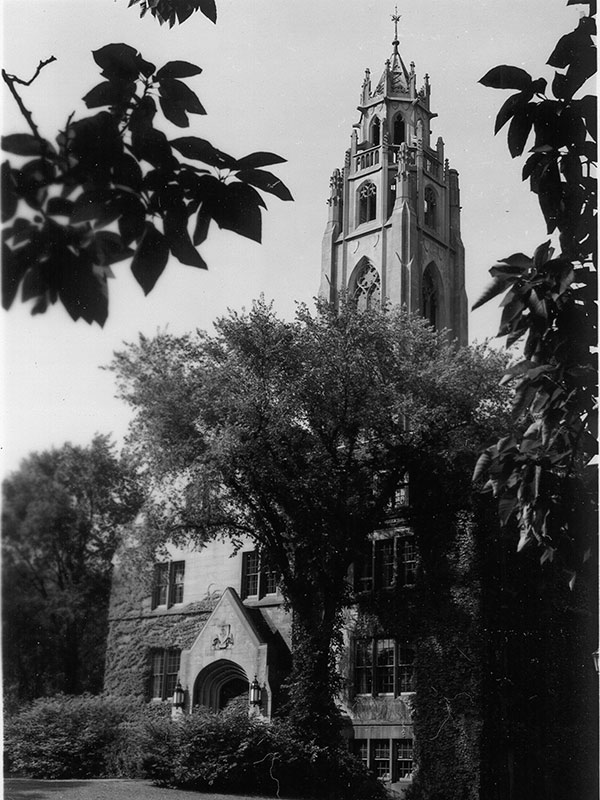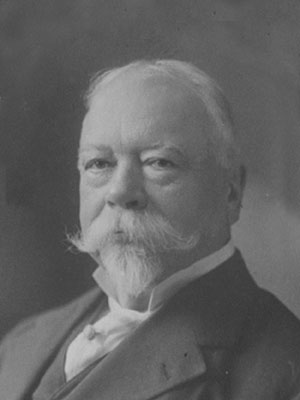In Review
 A MAN, A PLAN, A MORE PERFECT UNION: Known as the namesakes for Cutler Union (above)—now part of the Memorial Art Gallery—James (below) and Anna Cutler also provided support to establish a lecture series that celebrated its 100th anniversary this year and to create a scholarship for women students. (Photo: University Libraries/Department of Rare Books, Special Collections, and Preservation)
A MAN, A PLAN, A MORE PERFECT UNION: Known as the namesakes for Cutler Union (above)—now part of the Memorial Art Gallery—James (below) and Anna Cutler also provided support to establish a lecture series that celebrated its 100th anniversary this year and to create a scholarship for women students. (Photo: University Libraries/Department of Rare Books, Special Collections, and Preservation) (Photo: University Libraries/Department of Rare Books, Special Collections, and Preservation)
(Photo: University Libraries/Department of Rare Books, Special Collections, and Preservation)Need History?
Do you have a question about University history? Email it to rochrev@rochester.edu. Please put “Ask the Archivist“ in the subject line.
As we mark the centenary of the Cutler Lectures, which are hosted by the political science department, we were wondering if you had information on the series. Who endowed the lectures? Who have some of the distinguished lecturers been? We’d be grateful for any background you could discover and share. &#mdash;Gerald Gamm, professor of political science and of history
In addition to his eponymous lecture series, the name of former Rochester mayor and architect James Goold Cutler (1848–1927) is perhaps most frequently associated at the University with Cutler Union, now part of the Memorial Art Gallery complex. Beyond Rochester, it is the Cutler mail chute—his invention to easily route letters in multistory buildings—that is most familiar.
Cutler’s correspondence with President Rush Rhees reveals a strong personality with strongly held opinions. An April 3, 1920, letter in the University Archives from Cutler to Rhees proposes:
It appears to me that the most useful contribution which I can make to promote the making of democracy safe for the world (to invert Mr. Wilson’s aphorism) is to found in the University of Rochester, a course of lectures, designed to promote serious consideration, and consideration by as many people as possible, of certain points fundamental, and therefore, vital, to the permanence of constitutional government in the United States.
Despite his reference to Woodrow Wilson, Cutler was not a great fan, noting, “I think the choice should fall upon a man who stands actively before the public as a loyal American citizen, sound on Constitutional government and not tainted in any way with Mr. Wilson’s nebulous idealism.”
Taking as his model the Stafford Little Lectures established at Princeton University in 1908 and launched by former President Grover Cleveland, Cutler wanted “to secure a man of commanding position, as the first lecturer, who will strike our keynote at the outset.”
Rhees and Cutler exchanged the names of several possible speakers, including financier Otto Kahn and former US ambassador to Germany David Jayne Hill. Hill’s status as Rhees’s predecessor at Rochester was considered a disadvantage by Cutler, who felt that a “man less prominently associated with the University would be preferable.”
The first speaker held two of the most commanding positions possible: William Howard Taft completed his only term as president of the United States in 1913 and was named chief justice of the US Supreme Court three months after delivering the inaugural Cutler Lecture on April 2, 1921.
While many early lectures were delivered by jurists and legislators—Hill would speak in 1926—it became more common to invite academics in later years. Exceptions were Heinrich Brüning, former chancellor of Germany (1938), and Mitchell Sharpe, finance minister of Canada (1966). The lecture fund has also supported conferences in honor of Rochester professors Richard Fenno (1997), Richard Niemi (2007), and Bingham Powell (2010).
Cutler and his wife, Anna, were strong supporters of women’s education, and their legacy gift of $2.6 million was used to establish the Anna G. Cutler Scholarship and to fund construction of the Cutler Union for the College for Women on the Prince Street Campus.
Though delayed a year by the pandemic, it was fitting that the 2021 speaker was Christina Wolbrecht, professor of political science and director of the Rooney Center for the Study of American Democracy at the University of Notre Dame, lecturing on “A Century of Votes for Women.”
Find a list of past Cutler Lecture speakers and more Cutler history.

